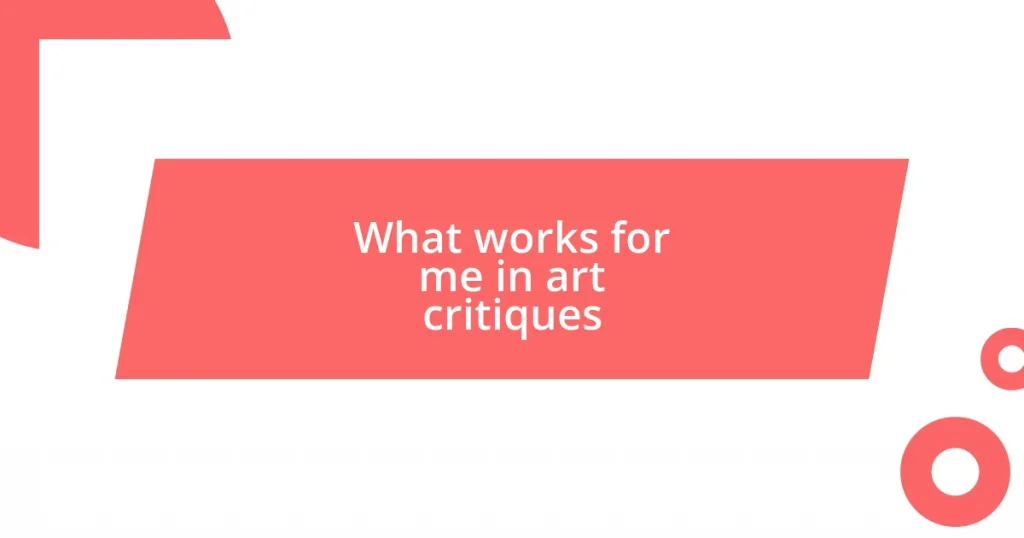Key takeaways:
- Author branding encompasses your unique voice, themes, and personal experiences, which resonate emotionally with readers and foster loyalty.
- Building a strong online presence and engaging authentically with your audience, through sharing personal stories and hosting events, enhances connection and community.
- Evaluating brand success involves analyzing engagement metrics and seeking feedback, focusing on the meaningful impacts of your work rather than just sales numbers.
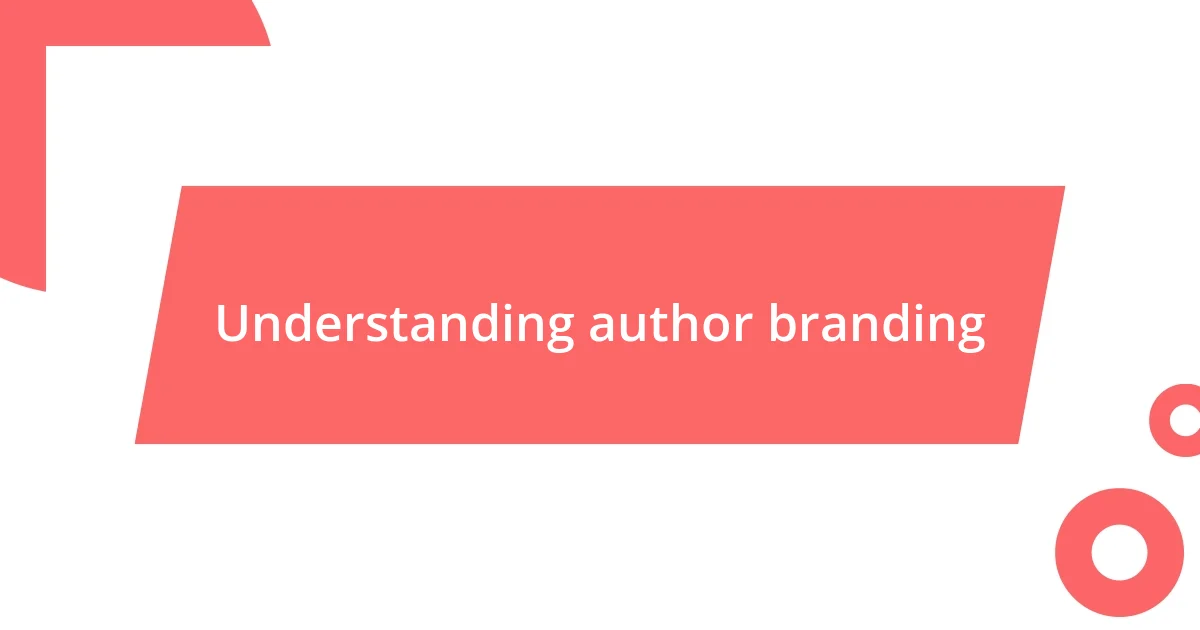
Understanding author branding
Author branding is more than just a catchy name or a logo; it’s the essence of who you are as a writer. At its core, it encompasses your unique voice, style, and the themes you consistently explore in your work. I often think about how my favorite authors have distinct identities—whether it’s the dark humor of Neil Gaiman or the poetic prose of Toni Morrison—they leave an imprint that resonates with their audience long after the last page is turned.
When I first started to build my author brand, I struggled to identify what truly set me apart. It wasn’t until a friend pointed out how my personal experiences shaped the stories I told that the light bulb went off. I realized that my journey—filled with both triumphs and setbacks—was integral to my brand. This brings me to a vital question: How well do you understand the stories that have shaped your writing? Reflecting on this can give you incredible clarity as you shape your author identity.
As you develop your author brand, consider the emotions you want to evoke in your readers. For me, crafting narratives that inspire hope while weaving in real-life struggles has always been my goal. By aiming for authenticity and connecting with your audience on an emotional level, you create a brand that doesn’t just sell books but builds lasting relationships with readers. How does your writing make you feel, and how do you want it to make your readers feel? It’s that emotional connection that forms the bedrock of effective author branding.
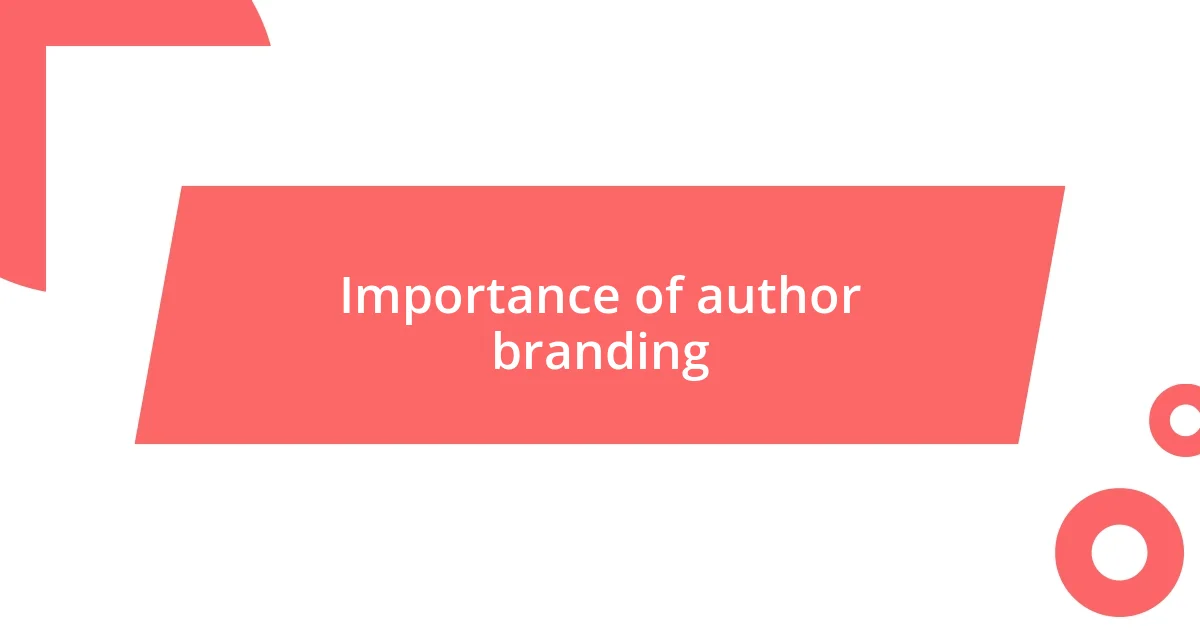
Importance of author branding
Author branding is crucial because it sets you apart in a crowded literary landscape. I remember the moment I grasped this: a fellow author in my workshop explained how her brand not only reflected her writing style but also who she was as a person. This personal connection created a deeper bond with her readers, making them more invested in her journey. It’s not just about selling books; it’s about creating a loyal community.
When I reflect on the authors I admire, it’s clear that they don’t just write; they create experiences. The importance of author branding lies in crafting a narrative that transcends the pages of a book. Readers are drawn to brands that resonate with their values and beliefs. For instance, I’ve noticed that my stories, which often revolve around resilience, resonate with audiences who’ve faced similar struggles. This mutual understanding fosters a strong reader-writer relationship that can last a lifetime.
Ultimately, effective author branding influences your visibility and marketability in the literary market. The more authentic your brand, the more likely your work will stand out. I think about the time I shared a personal anecdote with my audience about overcoming self-doubt. The response was overwhelming! It highlighted how sharing vulnerability can make your brand relatable and foster connections that drive engagement.
| Benefits of Author Branding | Impact |
|---|---|
| Differentiation from Others | Helps create a unique identity in a saturated market. |
| Building Trust with Readers | Creates a loyal following based on authenticity and connection. |
| Improved Marketability | Increases potential for visibility within the literary community. |
| Emotional Connections | Establishes deeper relationships that encourage reader investment. |
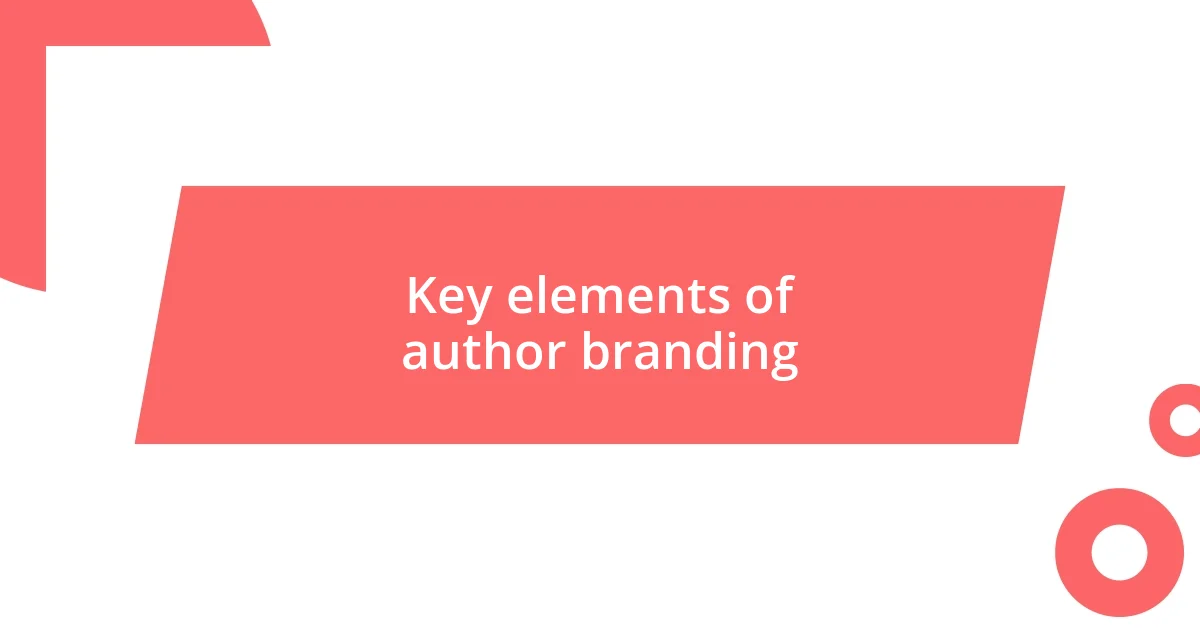
Key elements of author branding
I believe that there are several key elements that shape an effective author brand. First and foremost is voice. Your unique voice is that special sauce that flavors everything you create. It’s what makes your writing uniquely yours. When I was starting out, I tried to mimic styles I admired. It wasn’t until I embraced my genuine voice—quirky, candid, and unfiltered—that I felt my brand truly began to take shape. Alongside voice, consistency in theme and messaging plays a critical role. Readers engage with authors who offer a consistent narrative thread, whether through recurring themes or the emotional tones they explore.
Here are some essential components to consider when crafting your author brand:
- Unique Voice: Your distinct writing style and tone that sets you apart.
- Consistent Themes: The subjects and ideas you return to in your work, which resonate with readers.
- Visual Identity: Elements like your book covers, website design, and social media presence that visually reflect your brand.
- Audience Engagement: Interaction with your readers, whether through social media, newsletters, or events, helps build community.
- Authenticity: Being genuine in your interactions and content fosters trust and loyalty.
Reflecting on these elements can help you articulate your vision as an author. There’s a palpable sense of achievement when everything aligns, much like the first time I realized my audience fully connected with a character inspired by my own struggles. It made me think, “This is my brand—this is who I am as a writer!”
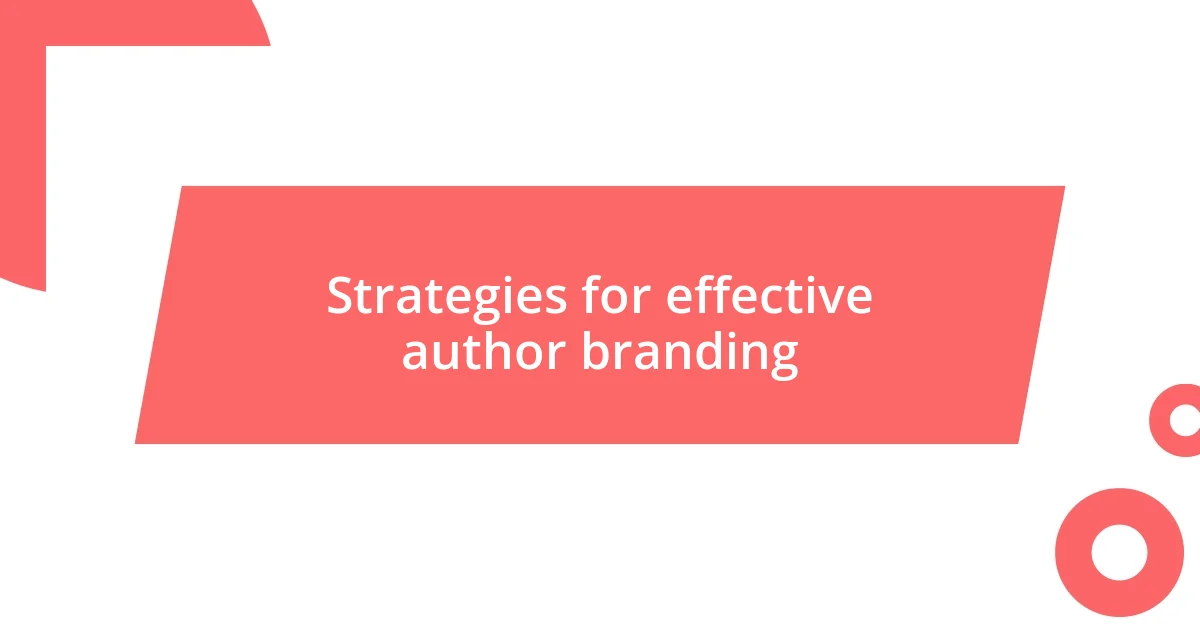
Strategies for effective author branding
Sure, let’s delve into some strategies for effective author branding. One of the first places I suggest starting is by establishing a strong online presence. When I launched my author website, it felt like opening a digital storefront that showcased not just my books, but also my personality. I was intentional about my social media engagement, sharing posts that mirrored my interests and resonated with my readers. Isn’t it fascinating how a simple tweet or Insta story can spark meaningful connections?
Another crucial strategy is leveraging storytelling to convey your personal journey. I often share snippets of my writing process or the challenges I’ve faced along the way. This transparency not only humanizes my brand but also allows readers to relate on a deeper level. Think about it—when was the last time an author’s story inspired you? It’s those authentic narratives that create lasting impressions and encourage fans to become advocates for your work.
Finally, I’ve learned the importance of nurturing community. Hosting virtual book clubs or Q&A sessions has shown me firsthand how invested readers become when they feel welcomed in your space. I remember one session where a reader shared how my book helped them through a tough time. Moments like these reinforce the power of connection in author branding—it’s not just about promoting a book, but about fostering a vibrant community where everyone feels like they belong.

Building your online presence
Building your online presence is like setting the stage for a performance—everyone gets to see who you are before the show begins. When I created my author website, I wanted it to reflect not just my books, but the heart behind them. It was a mix of excitement and nervousness; I remember staring at the screen, thinking, “This is my first impression. What do I want it to say?”
Engaging on social media was another revelation for me. At first, I was hesitant about sharing too much of my personal life, but then I discovered the magic of storytelling. I started posting anecdotes about the quirky moments in my writing journey. Once, I even shared how I used a failing plot twist as inspiration for a short story, and the response was amazing! Readers began interacting, sharing their own experiences, which made me realize that authenticity resonates deeply. Have you ever connected with someone over a similar embarrassing mishap? Those shared moments can create real bonds.
Then there’s the visual aspect—this was a game changer for my brand. I experimented with graphics that showcased my writing process and even snippets from my works. I felt a rush the first time I received a compliment about my cover design from a reader on Instagram. It warmed my heart to know that my aesthetic choices could evoke such a response. Building your online presence is not just about visibility; it’s about creating a multi-dimensional experience that invites your audience to join you on this journey.
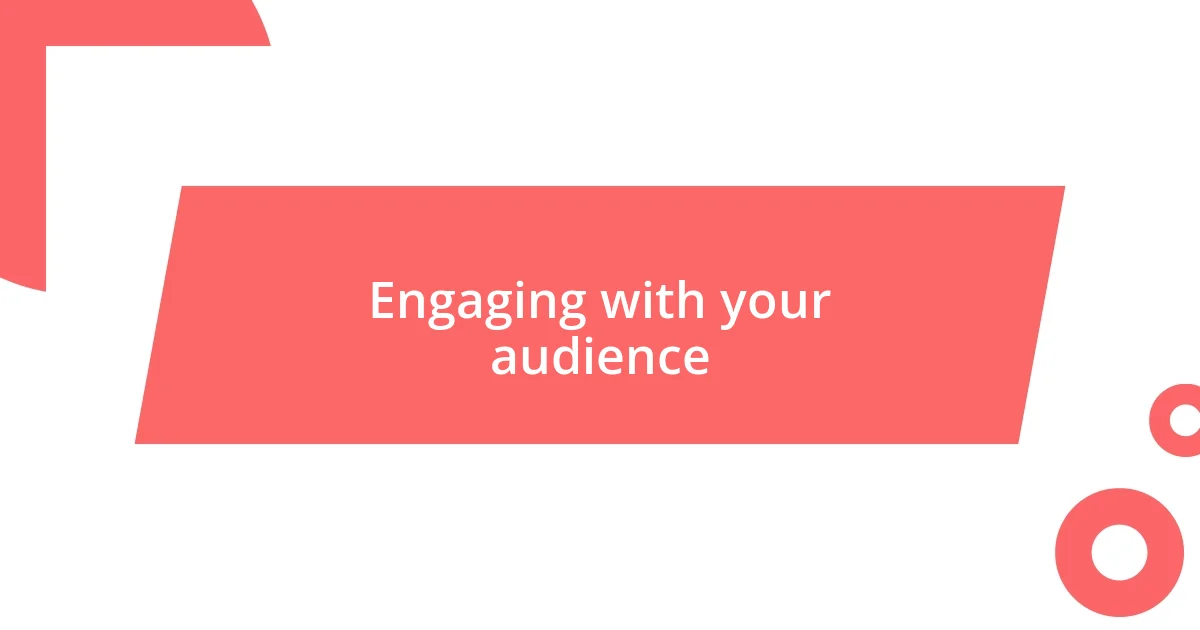
Engaging with your audience
Engaging with your audience is all about creating authentic connections. I remember my first live reading event; I was nervous, facing a sea of eager faces. Yet, that moment transformed into a conversation. I invited questions and, to my surprise, many readers opened up about their favorite characters or themes. It felt exhilarating to see how my stories resonated with them, and it made me wonder: how many more meaningful connections could I create if I continued to invite dialogue?
Social media, for me, has been more than just a promotion platform; it’s a space for genuine interaction. I started a “Writer’s Friday” post where I share not just writing tips, but also what inspires me each week. One day, I shared a picture of my cat, curled up beside my notebooks, and the flood of comments about beloved pets made me chuckle. I realized that these small glimpses into my life fostered a sense of familiarity, making readers feel less like strangers and more like friends. Have you ever noticed how a little personal touch can turn a simple comment into a memorable exchange?
I also found that organizing thematic challenges boosts engagement. Recently, I hosted a “Describe Your Favorite Book in Emojis” challenge. The creativity that flowed from my readers was astounding! Their responses not only gave me insight into their tastes but also created a playful community spirit. It struck me how sharing fun experiences can cultivate loyalty; readers felt inspired to return not just for my books, but for the community we’ve built together. The thrill of seeing my audience engaged in sparking creativity is something I cherish deeply.

Evaluating your author brand success
Evaluating your author brand success isn’t just about numbers; it’s about the meaningful connections that emerge from your efforts. I vividly remember receiving an email from a reader who shared how one of my characters helped them through a tough time. That moment reminded me that my impact as an author goes beyond sales figures. Have you ever had a moment where you realized the true influence of your words? Those moments are the gold stars of success, guiding us to understand what resonates with our audience.
Analyzing engagement metrics also plays a significant role in assessing brand success. I embarked on a journey to dissect my social media insights, thrilled to discover which posts garnered the most interaction. Some content, like when I divulged my struggles with writer’s block, sparked heartfelt discussions. This reflective process highlighted the necessity of aligning my message with the interests and emotions of my readers. Have you taken the time to dive into your analytics? I found that each metric tells a story that can steer my efforts in a more impactful direction.
Finally, seeking feedback can be a transformative step in evaluating your brand. I once ran a small survey among my newsletter subscribers, asking them what they enjoyed most about my writing and brand. The feedback was enlightening! Readers shared not only their favorite plot twists but also their desire for more behind-the-scenes insights. It reinforced the idea that my audience craves interaction and insight. Have you considered letting your readers guide your brand evolution? Their perspectives can become the heartbeat of your author journey.













